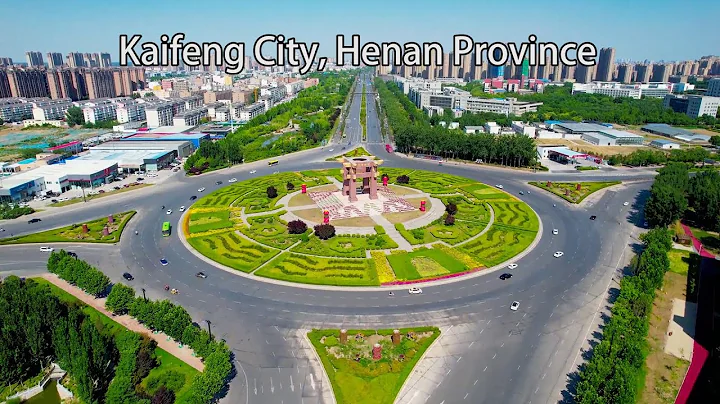

Gao Yiping is from West Street, Chengguan Town, Ruyang County. Born in West Street, County, in July 1922, he was smart and studious when he was young. In 1942, he was admitted to Kaifeng High School in Henan Province. While in school, he took to the streets many times to participate in anti-Japanese propaganda. In 1944, after graduating from high school, he was admitted to the pre-university class set up by the Ministry of Education in Baisha, Jiangjin, Chongqing. While studying in Chongqing, Gao Yiping made many friends with progressive ideas, read a large number of revolutionary theory books, became a progressive student, and actively participated in anti-Japanese activities led by the underground party organizations of the Communist Party of China. Gao Yiping had outstanding academic performance. In May 1946, he was recommended by the Ministry of Education to study in the Department of Education of Peking University, where he also majored in History. In June, he joined the "Practical Learning Society" of and Peking University under the direct leadership of the Communist Party of China, and systematically studied Marxist principles. Then, under the arrangement of Ye Xiangzhong, the head of Peking University’s underground party, Gao Yiping was appointed as the head of the Practical Society of Peking University’s Fourth Hospital. Under the direct leadership of the Communist Party of China, we insist on covert struggle, organize members to learn the Marxist-Leninist philosophy, and publicize the basic views of the Communist Party of China. Without revolutionary theory, there will be no revolutionary action. Gao Yiping secretly organized everyone to study " New Democracy Theory ", "Rectification Documents", "Chinese Revolution and the Chinese Communist Party", so that everyone could clearly understand the purpose, tasks, motivation, objects, steps, and methods of the Chinese revolution, and thus determine the future of their lives. the way. Gao Yiping also helps members make progress through activities such as seminars, life meetings, and heart-to-heart walks. The study of current affairs in Shixue Society is based on the spirit of the Party Central Committee and closely combined with the ideological situation of the masses to carry out publicity and education.

On December 26, 1946, the U.S. military raped Shen Chong, a female student at Peking University, which immediately ignited the anger simmering in the hearts of Peking University students. On the evening of the 28th, under the leadership of the Communist Party of China, Gao Yiping organized members of the Fourth Academy’s Practical Society to set off a climax of indignant protests. Statements, essays, poems, cartoons, and some large-character posters were plastered all over the walls of the office building. Copy posters and big-character posters from some department-level societies on the beach. On December 30, Gao Yiping took the lead and took to the streets with Peking University students to hold a march against the atrocities of the US military. Gao Yiping always stood at the forefront of the anti-Chiang and anti-American revolutionary patriotic student movements. In 1947, with the victorious development of the People's Liberation War, an unprecedented severe economic crisis broke out in the areas governed by the Kuomintang. The National Government issued the "Economic Emergency Measures Plan" in February and announced the freezing of the living index, thus arousing The broad masses of the people were dissatisfied and the struggle against the Kuomintang rule was growing day by day. On May 4, Shanghai students commemorated the 28th anniversary of the May 4th Movement and took to the streets to propagandize against the civil war, but were suppressed by the Kuomintang military and police. Under the leadership of the Communist Party of China, students from various schools immediately went on strike to protest and went to the city hall to petition, shouting: "I oppose fighting a civil war in the front and beating students in the rear." On the 15th, more than 3,000 people from Nanjing Central University , Drama School, Music School, Oriental Languages School and other schools went to the Ministry of Education to protest against the civil war, holding banners that read, "The wine and meat in Zhumen stink, and there are frozen bones on the road." petition. On the 16th, the Peking University Faculty Association put forward the slogan "anti-hunger and anti-civil war." On the 17th, the Peking University Faculty Congress decided to go on strike for three days starting from the 19th. Gao Yiping took the Fourth Hospital propaganda team to the streets to publicize. The vigorous development of the student movement alarmed the Kuomintang authorities. On the 18th, they promulgated the "Temporary Measures for Maintaining Social Order", which strictly prohibited petitions of more than ten people and all strikes and demonstrations, and attempted to use brutal means such as arrests, imprisonment, beatings, and massacres to deal with it. students, and the student movement is thus expanding day by day. On the 20th, students in Beijing and Tianjin also held "anti-hunger and anti-civil war" demonstrations. Students in Tianjin were severely beaten during the demonstrations, and more than 50 students were beaten and injured by military police, resulting in the "May 20" massacre that shocked the country. After the May 20th massacre, the Communist Party of China put forward the slogan of "anti-persecution" and pushed the movement to a new stage. Peking University held a class strike to "anti-hunger, anti-civil war, and anti-persecution". Gao Yiping and his classmates went to the streets to demonstrate.

In the struggle to welcome the liberation of Peiping, Gao Yiping led the Shixue Society to successfully complete the policy of persisting in long-term concealment given by the party organization, thereby accumulating strength for the party to welcome the liberation and uniting some people who studied hard and had the requirement to explore the truth. intellectuals and guide them gradually towards the path of revolution. After the Shixue Society systematically studied Marxism-Leninism and organized members to participate in the student movement struggle, the vast majority of members have joined the party organization. Since members of the Shixue Society have been tempered by certain revolutionary struggles and have a certain foundation in revolutionary theory before joining the party, they can withstand various tests under any difficult circumstances after joining the party and maintain their faith in Marxism and the Communist Party. Always the same.

In September 1947, Gao Yiping was introduced by Huang Yuzhong, an underground party member of Peking University, and secretly swore an oath at Peking University to honorably join the Communist Party of China. Later, Lin Naishen was appointed as the superior and had a single line of contact to work for the party. In March 1948, after Lin Naishen was transferred to the beach, Tian Jiasheng was appointed as secretary of the Southern Department Party Branch of Peking University Fourth Hospital, and Gao Yiping was elected as a member. During Gao Yiping's tenure as a member of the Party branch of the Communist Party of China, he successively promoted progressive young people such as Wang Changding from the Law Department of Peking University Fourth Hospital, Lai Shiyi from the Department of Economics of Peking University, Fang Hong from the Department of Education of Peking University, Li Dexing from the Department of Philosophy of Peking University, and Huang Yuchun from the Department of Economics of Peking University to join the Communist Party of China. . When the powerful People's Liberation Army surrounded Beijing, in order to welcome the liberation, Gao Yiping followed the instructions of the party organization and actively participated in activities such as protecting the ancient city of Peiping and protecting the school, and did a lot of work.

On January 31, 1949, Peking declared peaceful liberation. On February 4, a swearing-in meeting for Peking underground party members was held in the auditorium of the Fourth Hospital of Peking University. Gao Yipingcai and other underground party members revealed their identities as members of the Chinese Communist Party.

In December 1949, after graduating from the Department of Education of Peking University, Gao Yiping was urgently recruited to the first accelerated middle school in New China, the Beijing Experimental Industrial and Peasant Express Middle School, organized by the Central Ministry of Education, as the director of the general affairs department. Since the preparations in January 1950, Gao Yiping has been running around and receiving strong support from the Beijing Municipal Education Bureau, helping to borrow 50 houses from Datong Middle School on Foreign Affairs Street, Dongcheng District, to be used as a school building. At the same time, industrial workers, government officials, and military soldiers are recruited to enroll. On April 3, Beijing Experimental Industrial and Peasant Express High School opened its doors. The opening ceremony was extremely grand. Ma Xulun, the first Minister of Education of the People’s Republic of China, personally led a team to attend the congratulations. Vice Ministers Qian Junrui, Wei Qi, and Lin Liru attended the opening ceremony. While working at the Beijing Experimental Industrial and Peasant Express High School, in addition to doing the school's logistics and general affairs, I also had part-time teaching duties. In July 1952, the Central Ministry of Education transferred the Beijing Experimental Industrial and Peasant Express High School directly under it to the Renmin University of China. Gao Yiping was also transferred to work at Renmin University of China. In 1956, Gao Yiping was transferred to the Marxism-Leninism Teaching and Research Section and the Economics Department of Peking University, where he devoted himself wholeheartedly to the revolutionary cause of the party and the people and the spread of Marxism in China. On October 11, 1957, he died of stomach cancer due to overwork. He was 35 years old and was buried in Babaoshan Revolutionary Cemetery in Beijing.

In the struggle to welcome the liberation of Peiping, Gao Yiping braved the severe moments when a large number of progressive students were arrested, imprisoned, beaten, and massacred by the Kuomintang, and resolutely led the Shixue Society to march on the streets of Peking against the United States and Chiang Kai-shek. He actively requested to join the Communist Party of China and transformed from a patriotic young student into a communist. From then on, he devoted his life to realizing communism.























